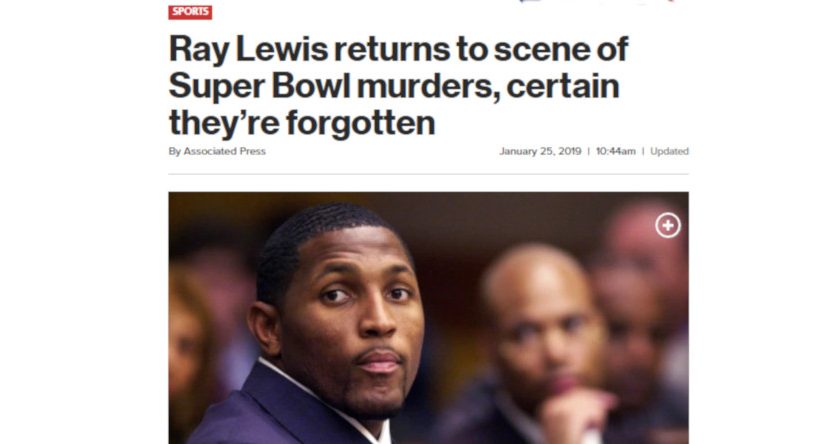The New York Post has long been known for provocative headlines, from “Headless body in topless bar” on down. But they delivered an interesting sports one Friday, using “Ray Lewis returns to scene of Super Bowl murders, certain they’re forgotten.” Notably, that headline wasn’t for a piece original to the Post, but for an AP piece by Charles Odum, which carried the much milder headline of “Lewis back at an Atlanta Super Bowl 19 years after arrest” on the AP’s own site Thursday. And while news outlets that subscribe to the AP and other wire services often rewrite wire stories’ headlines, and are quite entitled to do so under the terms of their subscription, this stood out as one that was perhaps a stretch for what the story actually covered.
Odum’s story absolutely focuses on what happened after the Super Bowl in Atlanta in 2000, which saw two men stabbed to death, Lewis and a pair of friends charged with aggravated assault and murder, blood in Lewis’ limo, a missing white suit, Lewis eventually pleading guilty to a misdemeanor charge of obstruction of justice and testifying against his friends (who were later both acquitted), and Lewis being sentenced to a year of probation, being fined by the NFL, and settling out of court with the victims’ families. But it also talks about Lewis’ current comments on that, his plans to host a Super Bowl party this year, his charity and more. And on the headline front, “Ray Lewis returns to scene of Super Bowl murders” is only partly correct; he’s in the same city, but that’s not entirely “at the scene,” and “Super Bowl murders” doesn’t seem quite right given that no one was convicted of murder. “Super Bowl deaths” would be more accurate.
But it’s the “certain they’re forgotten” that might be a real stretch, as Lewis doesn’t actually say that. It’s implied in the story with “Lewis, 43, has moved on and believes others have as well,” but his only quotes on that front are “My sisters live in Atlanta, I’ve been in Atlanta for years, all over Atlanta.” And it would seem pretty dumb for Lewis to outright say everyone’s forgotten about those deaths, as they obviously haven’t. So he didn’t actually say that, even if the Post‘s headline implied he did.
None of that’s really to complain about this story. Odum does a pretty good job of relaying what happened, providing the details of what Lewis is doing now (he’s hosting a pre-Super Bowl party with tickets priced from $750 to $2,500 for Lewis “Ray of Hope Foundation,” which has a “roster of athletes, coaches and other celebrities” that “provide short, uplifting personalized videos for those in dire need, including sick children”; whether raising money to provide personalized inspirational videos from the likes of Trent Dilfer and Merrill Hoge is a worthwhile cause depends on your point of view, but it is detailed that that’s what Lewis is doing), and getting charity partner and financial advisor Rob Vaka and NFL Network’s Deion Sanders to weigh in on how they see Lewis in light of what happened in 2000. All of that’s fair.
And it feels relevant to talk about that story again given Lewis’ continued prominence in the media, and given that 2000 was the last Super Bowl held in Atlanta, and the AP’s handling of it isn’t bad. But the Post‘s headlining of it is highly sensationalist, and not really supported by the story, and probably disappointing to those who clicked through hoping for an actually-problematic comment from Lewis. And it probably hasn’t even got them the attention they hoped for; as of 2:45 p.m. Eastern, four hours after they posted the story, their tweet of it only had 15 retweets. That’s no “Headless body in topless bar,” sirs.






